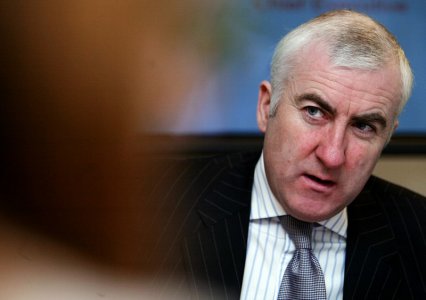 Thomson ReutersDenis Casey speaks at a Reuters news forum in Dublin
Thomson ReutersDenis Casey speaks at a Reuters news forum in Dublin
The criminal trial, Ireland’s longest ever, also convicted two former executives of failed Anglo Irish Bank, John Bowe and Willie McAteer, earlier this month on the same charges of defrauding investors, depositors and lenders.
Former Irish Life and Permanent finance director Peter Fitzpatrick was acquitted last week.
All four men were accused of conspiring together and with others to mislead investors by setting up a 7.2 billion euro ($8.2 billion) circular transaction scheme between March and September 2008 to bolster Anglo’s balance sheet.
Casey, 56, looked straight ahead as the verdict was read on day 89 of the trial following almost 62 hours of deliberation by the jury. He will be sentenced alongside Bowe, 52, and McAteer, 65, on July 25.
No senior banker has to date been jailed since the banking crisis forced Dublin to seek a three-year bailout in 2010. The penalty is at the judge’s discretion and there is no maximum sentence for the offence.
Former Anglo finance director McAteer was convicted on charges of illegal lending and providing unlawful assistance to investors in 2014 but sentenced to perform community service when a judge ruled he was “led into error and illegality” by the country’s financial regulator.
Lawyers for the accused had said during the trial that their motivation in authorizing the deal was the “green jersey” agenda, the financial regulator’s request for Irish banks to support one another as the finiancial crisis worsened.
Irish Life placed the deposits via a non-banking subsidiary in the run-up to Anglo’s financial year-end, to allow its rival to categorize them as customer deposits, viewed as more secure, rather than a deposit from another bank.
Anglo, described by Judge Martin Nolan during the 74-day trial as “probably the most reviled institution in the state”, was nationalized months later and put into liquidation in 2013.
Its failure cost taxpayers 30 billion euros, equivalent to around 15 percent of Ireland’s annual economic output and almost half the 64 billion euros Dublin had to pump into its banks to save the entire sector from collapse.
Irish Life and Permanent was broken up during the restructuring of Ireland’s financial sector and its banking arm, permanent tsb, remains under 75 percent state ownership.
(Writing by Padraic Halpin; Editing by Keith Weir/Ruth Pitchford)
Read the original article on Reuters. Copyright 2016. Follow Reuters on Twitter.
More from Reuters:
- New York to rein in tip seekers under new Times Square rules
- Chipotle shares at pricey multiples as Wall Street eyes May sales
- Three people killed in a small plane crash in Houston
- German economy minister urges quick addition of Russia to G7: website
- Vice President Biden to meet with Sanders on Thursday: source













